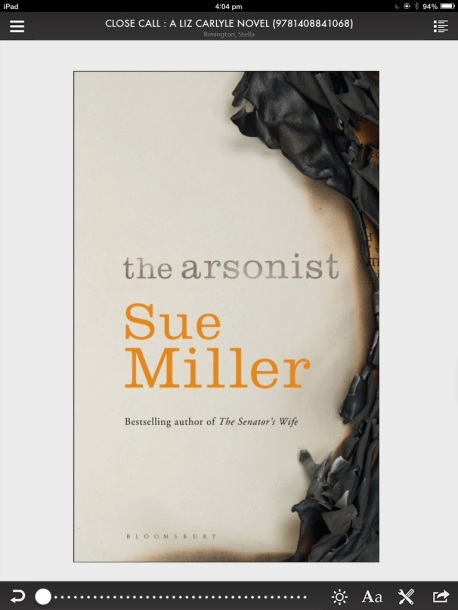A funny thing happened on the way to the iPad.
I had downloaded Sue Rimingtons “Close Call” from my local library. It had been sitting there for a couple of days and I was looking forward to it. So I tapped the icon to open it and had a moment of confusion. Something was wrong. I closed the book then re-opened it with the same result. The header said I was to read the book of my choice but the content was different. And so it was page after page. Somehow the wrong book had downloaded with the right header. See what I mean.
It was out of library hours so I couldn’t do anything about the mistake so I started to read this unsolicited book and got a pleasant surprise. The Arsonist by Sue Miller turned out to be a well told and interesting story.
There is a well blended mixture of aid workers in Africa, life in a small country American community, retirement, Alzheimer’s, an arsonist at work, producing a small town newspaper, the divisions which occur in a town over local issues, and of course, a love story to tie all threads together.
I found it quite seamless as it moved from setting to setting with different combinations of characters. There was never any confusion as to the people being written about and that to me is one of the most important skills that an author can have. To use as few words as possible when introducing a character but words so well chosen that you immediately have a mental image of the person
In one of the threads the character who is showing signs of Alzheimer’s Disease is very believable, gradually showing more signs of the progression of the illness. The author mentions Philip Larkins’ poem “The Old Fools”. I found it interesting how she just casually wove the name into the story. I wonder if it was her way of saying, Hey Reader, it’s time you learnt a bit more about this subject. It wasn’t until I had finished the book that I decided to check this out .found a whole Bibliography of Alzheimer’s in Poetry.
What do they think has happened, the old fools, To make them like this? Do they somehow suppose It's more grown-up when your mouth hangs open and drools, And you keep on pissing yourself, and can't remember Who called this morning? Or that, if they only chose, They could alter things back to when they danced all night, Or went to their wedding, or sloped arms some September? Or do they fancy there's really been no change, And they've always behaved as if they were crippled or tight, Or sat through days of thin continuous dreaming Watching the light move? If they don't (and they can't), it's strange; Why aren't they screaming?
Some writers think that Larkin is showing compassion. I fail to see it. I find him incredibly cruel. When our children are growing we take great pride in every little step that takes them closer to adulthood. We are patient with them (well most of the time) and respect the fact that they are going through a learning experience.. And I hope most of us show respect and compassion to those who are going through what might be thought of as a rather disorganized reverse procedure, where both mind and body start losing the physical and mental skills learned so long ago.
I say Well Done, Sue Miller. I haven’t read any of your books before but I would definitely like to read more. Meanwhile the Library is still trying to work out what happened to my book of choice.



